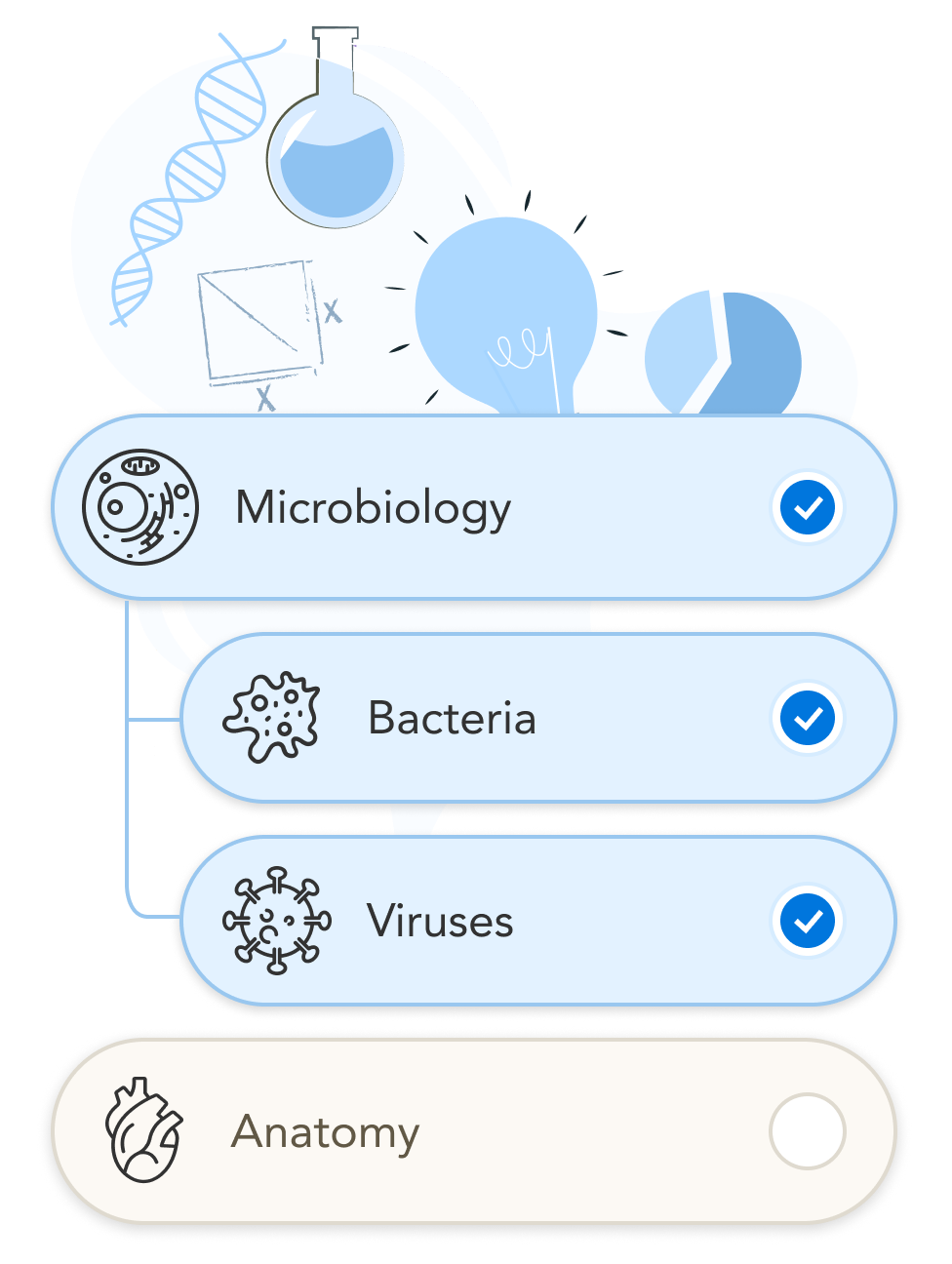
The NEET Biology syllabus for 2024 carries the highest weightage in the medical entrance examination, making it a crucial area for candidates to score well. Those aspiring to excel in the NEET test must be well-versed with thechapter-wise weightage of the NEET Biology syllabus. In the latest updates, the NMC has introduced reductions to theNEET Biology syllabus 2024. Candidates can refer to the table below for the updated syllabus details, ensuring they focus on the most pertinent topics.
| Particulars | Details |
|---|---|
| NEET Subject | Biology |
| Significance | Highest Marks Weightage |
| Syllabus Changes | NMC has reduced the syllabus for 2024 |
For medical candidates aiming to crack the NEET exam with flying colors, understanding the detailed structure of the NEET 2024 Biology syllabus is paramount. This knowledge enables a strategic study plan and ensures that no important topic is overlooked. Stay updated and prepare systematically to achieve your goal of becoming a healthcare professional.
The Biology syllabus for NEET is divided into two major sections — Botany and Zoology. Each section holds 50 marks, requiring the completion of 45 questions, thereby contributing to 360 marks in the total NEET score. Acquiring a clear understanding of the Biology syllabus can significantly elevate your NEET score. The NEET Biology syllabus 2024provides an almost equal distribution of questions from Classes 11 and 12. Hence, to attain a desirable result, aspirants need to thoroughly understand the entire NEET Biology syllabus.
The NEET 2024 bio syllabus encompasses a multitude of biological, scientific terms and facts that demand attention and retention. As per these requirements, aspirants must strategize their preparations. For a comprehensive understanding of class-wise syllabi, chapter-wise biology weightage, critical topics, best books, and preparation tips, refer to the article on the NEET biology syllabus 2024. This information plays a pivotal role in ensuring your preparations are both efficient and effective.
We are launching our platform soon! 👋🏽
Stay updated & get a limited early-bird 🕊️ discount!
Aspiring medical students preparing for NEET 2024 should diligently review the class 11 biology syllabus to ensure a robust foundational knowledge. Here we provide a detailed outline of the covered topics within theNEET biology syllabus 2024 for Class 11. Those looking for in-depth insight can also check out theSubject-wise whole NEET Syllabus 2024 available in PDF format.
| Unit Number | Unit Name | Topics |
|---|---|---|
| 1 | Diversity in Living World | What is living?; Biodiversity; Need for classification; Taxonomy & Systematics; Concept of species and taxonomic hierarchy; Binomial nomenclature; Five kingdom classification; salient features and classification of Monera, Protista and Fungi into major groups; Lichens; Viruses and Viroids; Salient features and classification of plants into major groups-Algae, Bryophytes, Pteridophytes, Gymnosperms; Salient features and classification of animals-nonchordate up to phyla level and chordate up to class level. |
| 2 | Structural Organisation in Animals and Plants | Morphology and modifications; Tissues; Anatomy and functions of different parts of flowering plants; Anatomy and functions of an insect (Frog). |
| 3 | Cell Structure and Function | Cell theory and cell as the basic unit of life; Structure of prokaryotic and eukaryotic cell; Chemical constituents of living cells; Enzymes; Cell division: Cell cycle, mitosis, meiosis. |
| 4 | Plant Physiology | Photosynthesis; Respiration; Plant growth and development. |
| 5 | Human Physiology | Breathing and Respiration; Body fluids and circulation; Excretory products and their elimination; Locomotion and Movement; Neural control and coordination; Chemical coordination and regulation. |
It is important to note that the syllabus aims for a clear understanding not just of basic concepts but also an appreciation of biological phenomena such as diseases and disorders. Thus, conditions like Asthma, Diabetes, andHeart Disorders should be comprehensively studied to grasp their biological underpinnings, keeping in mind their relevance to NEET.
NEET 2024 candidates targeting a top rank should acquaint themselves with the Class 12 biology syllabus. This meticulously curated syllabus encompasses the complexities of biological processes and theoretical knowledge crucial for the medical entrance examination. The following table lays out the detailed topics included in the syllabus.
| Unit Number | Unit Name | Topics |
|---|---|---|
| 6 | Reproduction | Sexual reproduction in flowering plants; Human Reproduction systems; Reproductive health: Need and strategies. |
| 7 | Genetics and Evolution | Heredity and variation; Molecular basis of Inheritance; Evolution: its origin and processes. |
| 8 | Biology and Human Welfare | Health and Disease; Pathogens; Microbes in human welfare. |
| 9 | Biotechnology and its Applications | Principles and process of Biotechnology; Application of Biotechnology in health and agriculture. |
| 10 | Ecology and Environment | Organisms and environment; Ecosystem: Patterns and processes; Biodiversity and its conservation. |
NEET syllabus aligns with the higher secondary level of schooling, thereby encouraging students to grasp concepts likeHuman Welfare, Biotechnological Applications, and Ecological Balance. Understanding the intricate details of each unit not only prepares students for NEET but also lays the groundwork for future medical studies.
Our students achieve excellent results
Rank high to secure your spot!

As part of the comprehensive NEET UG 2024 preparation, the Botany section of the syllabus requires thorough understanding. This syllabus comprises diverse topics that span Biochemistry, Cell Biology, Genetics, and Ecology—all of which are essential for aspiring medical students. Below, we detail the key topics covered in the Botany syllabus for NEET.
- The Living World: Basic concepts and significance of the living world in Botany.
- Biological Classification: Understanding the systematics of plant classification.
- Plant Kingdom: Detailed study of the plant kingdom including Algae, Bryophytes, Pteridophytes, Gymnosperms, and Angiosperms.
- Morphology of Flowering Plants: Structural details of flowering plants.
- Anatomy of Flowering Plants: Internal structure and functioning of flowering plants.
- Cell - The Unit of Life: In-depth study of the structure and function of the cell.
- Biomolecules: Role and structure of biomolecules in plant cells.
- Cell Cycle and Cell Division: Mechanism of cell cycle and cell division in plants.
- Transport in Plants: Mechanisms of transport and uptake of minerals and water.
- Mineral Nutrition: Essential nutrients for plant growth and their metabolic roles.
- Photosynthesis in Higher Plants: Processes and significances of photosynthesis.
- Respiration in Plants: Respiration types and pathways in plants.
- Plant Growth and Development: Plant hormones and their roles in growth and development.
- Sexual Reproduction in Flowering Plants: Reproduction mechanisms and structures involved.
- Principles of Inheritance & Variation: Mendelian genetics and its deviations.
- Molecular Basis of Inheritance: DNA replication, transcription, translation and gene regulation.
- Strategies for Enhancement in Food Production: Methods to increase food production including plant breeding.
- Biotechnology Principles and Processes: Genetic engineering and techniques of biotechnology.
- Biotechnology and its Application: Use of biotechnology in agriculture and pharmacology.
- Organisms and Populations: Ecology concepts pertinent to organisms and their habitats.
- Ecosystem: Organization and functions of ecosystems.
- Biodiversity and Conservation: Importance and strategies for biodiversity conservation.
- Environmental Issues: Major environmental issues and the regulatory mechanisms.
Mastery of these topics is not only crucial for NEET success but also serves as a stepping stone for future studies in the field of medical sciences, as knowledge of botany plays a significant role in understanding human and plant biology interactions.
We are launching our platform soon! 👋🏽
Stay updated & get a limited early-bird 🕊️ discount!
The NEET Zoology syllabus encompasses a broad spectrum of topics ranging from fundamental concepts to more advanced aspects of zoology. It's meticulously crafted to assess the comprehensive understanding of zoological principles among students planning to take the NEET UG 2024 exam. Highlighted below are the major topics included in the Zoology curriculum for NEET.
- Animal Kingdom: Exploration of the diverse phyla and classification.
- Structural Organisation in Animals: Detailed study of animal form and structure.
- Digestion and Absorption: Anatomy and physiology of the digestive process.
- Breathing and Exchange of Gases: Respiratory systems and gas exchange mechanisms.
- Body Fluids and Circulation: Composition and function of body fluids; circulatory mechanics.
- Excretory Products and their Elimination: Excretory systems and waste removal.
- Locomotion and Movement: Muscular and skeletal systems enabling movement.
- Neural Control and Coordination: Nervous system structure and impulse transmission.
- Chemical Coordination and Integration: Endocrine system and hormonal balance.
- Reproduction in Organisms: Reproductive systems across diverse species.
- Human Reproduction: Human reproductive anatomy and process.
- Reproductive Health: Topics on reproductive hygiene, contraception, and associated diseases.
- Evolution: Concepts and evidence supporting biological evolution.
- Human Health and Disease: Common conditions, their prevention and cure.
- Microbes in Human Welfare: Beneficial roles of microbes in biotechnology and health.
NEET aspirants are advised to focus on these topics as they form the core of the zoology questions in the exam. A firm grasp of these areas will not only prepare you for NEET but also provide a solid base for future studies in medical sciences, where an understanding of animal biology is crucial.
Embarking on the journey to conquer the NEET biology syllabus can be daunting, but with targeted strategies and effective study habits, aspirants can optimize their preparation for the NEET 2024 exam. Below are some of the key preparation tips that would help in streamlining the preparation process.
- Stick to NCERT: Avoid the confusion of multiple sources. NCERT textbooks for biology should be the core of your preparation.
- Target Important Topics: Ensure comprehensive coverage of all key topics listed in the NEET biology syllabus. Pay particular attention to topics of high weightage.
- Practice Rigorously: Focus on practicing questions, especially from areas pertaining directly to the NEET 2024 biology syllabus.
- Focus Areas: Dedicate more study time to chapters like human physiology, plant physiology, reproduction, genetics, and ecology, as they often carry more weight in the exam.
- Mock Tests: Regularly attempt NEET mock tests to improve your speed and accuracy, simulating exam conditions to enhance your readiness.
A systematic approach to preparation, incorporating these tips, will not only ensure the completion of the syllabus but also build the confidence and skill necessary to excel in the biology section of NEET 2024.
For NEET UG 2024 aspirants, the right set of books is key to efficient and effective preparation. We have compiled a selection of highly recommended books for NEET Biology, complete with author names, to help candidates make an informed decision.
| Best Biology Books for NEET 2024 | Author |
|---|---|
| Objective Biology (volumes 1 & 2) | GR Bathla |
| Biology Classes 11 and 12 (Volume 1 & 2) | Pradeep Publications |
| Objective Biology (Volume 1, 2, and 3 along with Practice Papers) | Dinesh Publications |
| A Class Book for Botany | A C Dutta |
| Objective Biology (volumes 1 and 2) | Trueman Publications |
It is recommended for candidates to choose books that not only cover the entire NEET syllabus but also complement their learning style. Books that come with practice papers are particularly advantageous as they enable students to apply their knowledge and gain confidence ahead of the examination.
To excel in the NEET 2024 exam, focusing on pivotal topics in biology is essential. The following are the highly significant chapters and topics for NEET UG 2024 preparation. These have been chosen due to their weightage and the consistency with which they appear in past year's exams.
- Plant Kingdom: Familiarize with types of algae, pteridophytes, and gymnosperms.
- Biological Classification: Explore the general characteristics of Monera, Protista, and Fungi.
- Structural Organization in Plants and Animals: Study root, stem, leaf anatomy, and animal tissues, particularly the epithelial tissues.
- Cell: Structure & Functions: Mycoplasma, cell organelles such as nucleus and ribosomes, meiosis - especially Prophase I.
- Plant Physiology: Details of photosynthesis (C3, C4 cycle), respiration (Glycolysis, Krebs cycle), and plant nutrition.
- Animal/Human Physiology: A comprehensive understanding of all topics with an emphasis on diagrams.
- Reproduction: Take a closer look at gametogenesis in plants and humans, and reproductive structures.
- Genetics & Evolution: Delve into Dihybrid cross, linkage, codominance, pedigree analysis, genetic disorders, and the principles of evolution.
- Biotechnology: Focus on processes and applications such as BT cotton, RNA interference, and gene therapy.
- Biology in Human Welfare: Study the immune system, diseases like AIDS and cancer, and the impact of drugs.
- Ecology and Environment: Investigate environmental issues, biogeochemical cycles, population interactions, and strategies for organismal adaptation and ecological succession.
These topics are a central part of the NEET syllabus and demand focused study. By giving these areas the attention they deserve, students can significantly enhance their chances of achieving a high score in the biology section of the NEET UG 2024 examination.


Before diving into the extensive study for NEET 2024, understanding the chapter-wise weightage of the biology section is crucial. Doing so provides candidates with insights into which chapters are more significant and which can yield higher scores. Below is the weightage distribution of different chapters making up the NEET Biology syllabus.
| Chapter | Weightage out of 100 |
|---|---|
| Diversity in Living World | 14% |
| Cell Structure and Function | 5% |
| Structural Organisation in Animals and Plants | 9% |
| Plant Physiology | 6% |
| Human Physiology | 20% |
| Reproduction | 9% |
| Genetics and Evolution | 18% |
| Biotechnology and Its Applications | 3% |
| Biology and Human Welfare | 4% |
| Ecology and Environment | 12% |
This data highlights the importance of chapters like Human Physiology and Genetics and Evolution which carry the highest weightage. While each chapter is vital to the overall NEET score, paying extra attention to these areas could significantly impact the outcome of a candidate's performance.
Frequently Asked Questions
FAQs - NEET Biology Syllabus 2024
All NEET topics in One platform 🇮🇳
Check the other two NEET 2024 subjects



